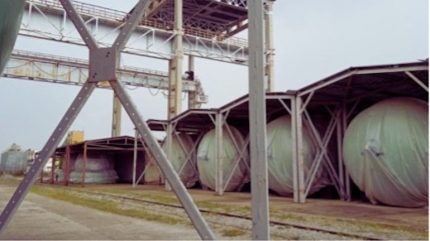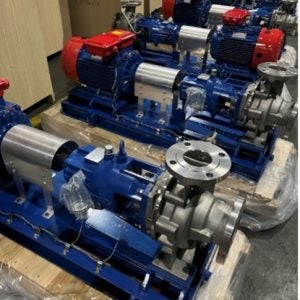
Ukraine’s Verkhovna Rada (parliament) has passed a law allowing nuclear utility Energoatom to buy two Soviet-designed nuclear reactors from Bulgaria cancelled Belene project for expansion of the Khmelnitsky NPP. Ukraine had planned in June 2024 to sign a deal to buy the two reactors from Bulgaria but was prevented by the absence of a law to allow the purchase.
The decision follows discussions led by International Atomic Energy Agency (IAEA) Director General Rafael Grossi during his recent visit to Ukraine. Grossi outlined the agency’s support in providing technical expertise and nuclear safety advice for the new reactors at Khmelnitsky. Westinghouse has said the planned reactors will be able to run on American-made fuel.
The Belene project envisaged the construction of two Russian VVER-1000/V-466 reactors and preliminary site works began in 2008. Contracts for components including large forgings and I&C systems were signed with suppliers. The plant was to be built by Atomstroyexport (part of Rosatom) after Russia won an international tender in 2006, but the project was cancelled in 2012 after a change of government. It was revived again briefly in 2018 after a series of arbitration procedures, which saw Bulgaria pay €601.6m ($691.5m) in compensation to Atomstroyexport for the equipment already manufactured. These components are now stored at the construction site and maintained regularly by Rosatom.
In January 2024, Ukraine’s Minister of Energy Herman Halushchenko revealed plans to build four new units at the Khmelnitsky NPP. These include two Russian designed VVER-1000 units to be built using equipment imported from the cancelled Belene project in Bulgaria. The other two will be Westinghouse-supplied AP-1000 units. Khmelnitsky currently operates two VVER-1000 units (1&2). Khmelnitsky’s first reactor was connected to the grid in 1987, but work on three others stopped in 1990 when unit 3 was 75% complete. Work on the second reactor restarted and it was connected to the grid in 2004, but units 3&4 remain unfinished.
Bulgaria’s National Assembly earlier instructed the Minister of Energy to start negotiations with Ukraine for the sale of the two Belene reactor pressure vessels and accompanying equipment for completion of Khmelnitsky 3&4. Ukrainian officials have said Bulgaria had previously put the price of the two reactors at $600m but so far no agreement has been finalised, although talks with Ukraine are continuing.
The law was passed in the Ukrainian parliament despite objections from some deputies. Officials said the purchase would make it possible to launch the first of the two new units in two-to-three years. That would significantly reduce power shortages in the country.
Deputy Oleksii Honcharenko said on his Telegram channel: “The Rada supports the purchase of Russian equipment for the Khmelnitsky nuclear power plant. It is planned to spend half a billion euros on this. This is some kind of absurdity! Spending money on Russian reactors during a war!” He noted that 261 out of 401 lawmakers had voted in favour.
Other lawmakers also raised concerns about the bill’s legitimacy noting that it was revised at some stage to accommodate the purchase decision, prompting transparency concerns, according to Ukrainian news outlet Zerkalo Nedeli.
Local legal outlet Sud.ua said Bill 11392, which included clauses on purchasing necessary equipment to build Khmelnitsky 3&4 had passed the second reading and awaits President Volodymyr Zelensky’s signature to become law. However, Zelenskyy has supported the purchase of the equipment. In his evening address on 11 February he said amendments allowing the acquisition of Russian-made energy units from Bulgaria would facilitate the completion of the Khmelnitsky units. He noted that the units could potentially cover Ukraine’s energy needs, which are currently met through imports.
“Of course, there are some voices of criticism. But these are the voices of those for whom cheap energy in Ukraine is simply not profitable- they fill their pockets or the pockets of those they depend on from higher energy prices than nuclear power,” he commented.
There has also been opposition in Bulgaria to the possible sale of the reactors to Ukraine. The opposition Vazrazhdane (Revival) party tabled a draft Resolution in the National Assembly cancelling negotiations with Ukraine on sale of the Belene equipment.
MP Iskra Mihaylova told journalists that Vazrazhdane wants the equipment to remain in Bulgaria and be used for the completion of the abandoned Belene plant project. She expects other political organisations who have stated similar positions, such as BSP – United Left, to convince their current coalition partners it is high time Bulgaria showed sound reasoning and did not sell and gift away the equipment. She noted that the price at which the negotiations with Ukraine are being conducted is their purchase price, which is literally no money. “This is a gift from the Bulgarian State. Given that the Ukrainian Parliament has already decided they can finish building nuclear units with Russian equipment and Russian specialists, I think it is already clear that Bulgaria too can do that.”






